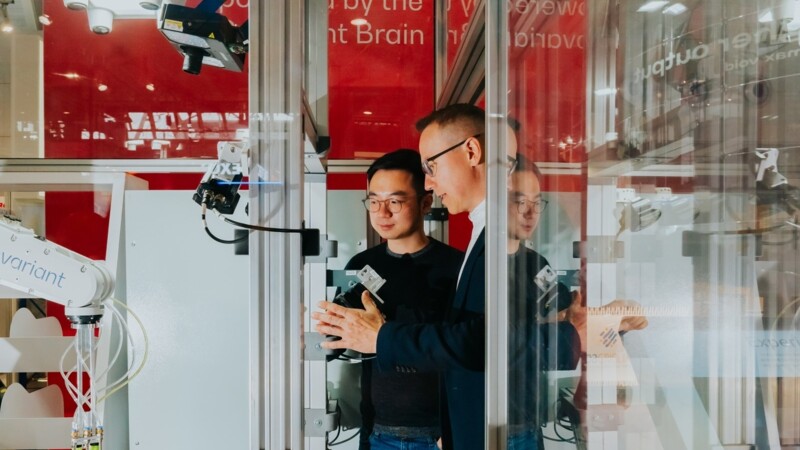Digitalisation and AI hold enormous potential for the economy. When it comes to competitiveness, there is no alternative to its use, and for administrative services, which must be improved in the public interest. In an era of increasing labour shortages, digitised workflows can boost both the economy and the administration. Companies in Hamburg have rated the lack of skilled labour as one of biggest risks to their business, according to the Chamber of Commerce's latest economic barometer. Thus, Hamburg must boost and advance digital developments.
Artificial intelligence (AI) holds both risks and all kinds of opportunities as this evolving technology is pivotal to Germany's international competitiveness. The European Union has initiated an EU-AI Act to create generally applicable regulations for its use in future. Friedrich-Joachim Mehmel, former president of the Hamburg Constitutional Court and the Hamburg Higher Administrative Court and now LawCom Institute, has long been concerned with the responsible use of AI and explains the background to the legislation in a guest commentary for Hamburg News.
No alternative to AI for economy

Responsible use of AI gaining importance
Apart from economic stability and satisfactory administrative services, the responsible use of AI (RAI) as well as potentially smoother procedures offered by the technology are gaining importance. Around 86 per cent of people interviewed appreciate its economic and social potential and the greater everyday ease, a survey by TÜV found in late 2022. At the same time, around 66 per cent of those interviewed expressed concern about discrimination through the misuse of AI. And given the emergence of Chat GPT, the debate has gained momentum recently.
Five criteria for RAI
Apart from digitising the administration and boosting Hamburg as an economic centre, RAI is crucial to bolstering trust in AI systems and making them more reliable. RAI is at the intersection of law and is measured, among others, by:
- explainability, i.e, how the result of AI comes about
- ethics and law, i.e., whether the use of AI is in accordance with European values and legal requirements
- fairness and sustainability i.e., no discrimination
- robustness and safety i.e., minimum outages and breakdowns
- process organisation i.e., clear processes and responsibilities for developing and operating AI applications
AI Act: Four areas of application
Based on these principles, the European Commission has stipulated legally binding, minimum requirements for using AI across the bloc. This risk-based approach is guided by the level of intervention in relation to four groups of applications:
- banned products
- high-risk products e.g., biometric identification, applications that impact critical infrastructure, or take over recruitment or performance evaluation of employees
- low-risk products e.g., chat ports
- applications without any risk

AI Act now in trialogue
The draft is aimed at all those in the value chain e.g., developers, manufacturers of AI systems, distributors, operators and users. The AI Act is currently in a trialogue involving the EU Commission, the European Council and the European Parliament. Although changes can be expected, the AI Act should come into force in late 2023 and start showing effects in 2024. Breaches of the AI Act will fined. An AI liability directive and a product liability directive, to be adapted accordingly, will facilitate claims for damages.
Goals of act
The AI Act aims to ensure socially-responsible AI, especially for high-risk applications, to bolster trust in AI and fosters an economic edge over non-European competitors. Businesses and administrations are advised to adjust to the AI Act's requirements and the principles of RAI.
Triad of technology, transformation and social responsibility
Hamburg, its businesses and administration, can pioneer socially-responsible AI and start implementing the steps required by the AI Act in two or two and a half years. The Artificial Intelligence Center Hamburg e. V. (ARIC) and the Law Com Institute have conducted studies on behalf of the city to identify the risks and opportunities of AI and to recommend measures. A triad of technology, transformation and social responsibility offers an opportunity for Hamburg as a location, nationally, internationally, and also to compete beyond Europe!
Guest commentary by Friedrich-Joachim Mehmel, partner at LawCom Institute
ys/pb
Read the other parts in our AI series:
Sources and further information
About the author:
Friedrich-Joachim Mehmel, 70, was President of the Hamburg Constitutional Court from 2016 to 2020 and President of the Hamburg Higher Administrative Court from 2014 to 2020. Mehmel has been a partner at the LawCom Institute since 2021 and focuses on projects that stand for the rule of law and democracy. That also involves overcoming the challenges posed by artificial intelligence for businesses, administration and the judiciary.
Hamburg's tradition in AI regulation
In October 2018, Mehmel and Professor Wolfgang Schulz, Director of the Leibniz Institute for Media Research / Hans Bredow Institute Hamburg, drafted "9 Theses on Opportunities and Risks, Democratic Legitimacy and Rule of Law Control in the Algorithmisation of Administration" based on the results of an expert conference in City Hall.
The theses state, for instance, that AI can lead to significantly more effective and efficient administrative procedures, but that the development of technical systems must account for reviews by administrative courts. The same applies to the principles of the rule of law, the requirement of democratic legitimacy and the limits of fundamental rights. The theses also emphasise a reflected, supportive use of technical systems in response to complex judicial activity and the need for swift decisions despite ongoing interdisciplinary proceedings. The experts conclude: "Based on the experience of co-operation across disciplinary boundaries and theory and practice, Hamburg offers itself as a platform for this." All nine theses can be found on: www.zukunft-der-verwaltungsgerichtsbarkeit.de
More
Similar articles

Hamburg's urban website scoops award for AI-based easy language

Three promising fields of application for generative AI

AI robots to power Otto Group's logistics network
